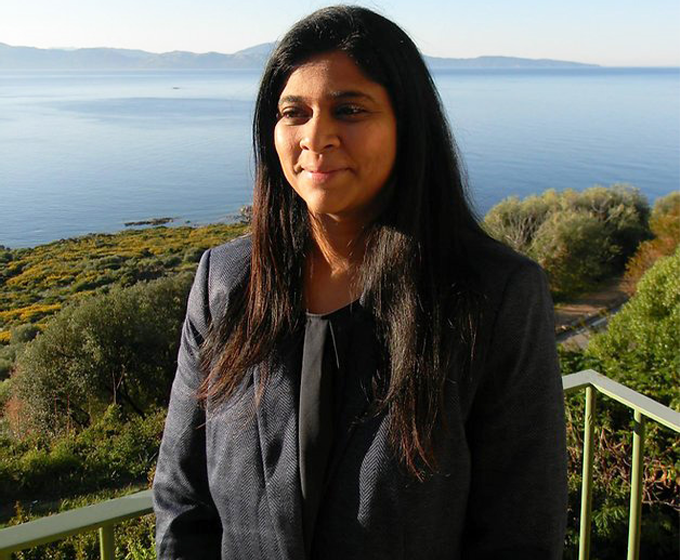
UTSA’s Kiran Bhaganagar is leading the study for NASA.
SEPTEMBER 23, 2020 — NASA has tapped UTSA to explore creating a strategy to develop its next generation workforce. The space agency wants to create early awareness opportunities for K–12 students, in particular more females and minorities, to become interested in classes in science, technology, engineering and math, known as STEM fields.
This area of study is the foundation for developing future talent in aeronautical engineering, data sciences, unmanned systems, network communications and other related fields. The first step of this initiative involves a $50,000 NASA grant to gather data and submit a concept paper identifying STEM curriculum gaps along with a plan to overcome the problem.
The effort—officially called the City-Based Integrated Engineering Training Alliance to Engage, Educate and Transform the Next Generation Stem Workforce—is led by Kiran Bhaganagar, an associate professor of mechanical engineering and co–principal investigator of the NASA Center for Advanced Measurements in Extreme Environments at UTSA.
Along with faculty members David Akopian, Karina Velma and Chris Combs, Bhaganagar is working with representatives from 16 prominent academic, government and research institutions in the community on the alliance concept, who all wrote letters to support the initiative.
“Eventually we want all of our K–12 students in the San Antonio area to have the skill sets to be employable in STEM-related careers,” Bhaganagar said. “Our vision is to create the next generation workforce and we want UTSA to be a model program in engineering. We want to create a mentoring network with all our alliance partners that is accessible by K–12 to UTSA graduate students in San Antonio.”
Bhaganagar is proposing a unique, multitiered alliance training model based on the concepts of engage, educate and transform. The engage section is targeted to pre–middle-school students. It seeks to provide them more opportunities for activity camps and engineering clubs.
The educate portion is for community college, high school and middle school students and proposes introductory training, summer internships and online study modules.
The transform section aims to prepare college students for the workforce through focused training, dual-mentorship programs and internships.
At UTSA females make up 21% of enrollment in the College of Engineering. According to 2018 research by DataUSA, 15% of all aerospace engineers are female. Approximately 15% of all aerospace engineers are minorities, with Hispanics representing less than 5% of the ethnic breakdown.
“As a Hispanic Serving Institution, UTSA is well-positioned to bridge the K–12 STEM curriculum in a community as diverse as San Antonio,” said Bhaganagar. “Our university has many existing collaborative partnerships that promote mutual benefit and alignment to gain insights into how to best respond to the needs of our stakeholders via research, educational initiatives, and community outreach and participation.”
UTSA is gathering feedback for this approach through three town hall meetings involving its 16 existing partners and new partners. The first is scheduled for October 3 and will involve K–12 academic leaders across all San Antonio school districts. Town halls will also be held for government and STEM industry sectors. All data will be compiled into a concept paper and evaluation plan that will be submitted to NASA’s Office of STEM Engagement.
Bhaganagar said NASA will review the submitted proposal and determine if any funding will be provided to move forward.
UTSA Today is produced by University Communications and Marketing, the official news source of The University of Texas at San Antonio. Send your feedback to news@utsa.edu. Keep up-to-date on UTSA news by visiting UTSA Today. Connect with UTSA online at Facebook, Twitter, Youtube and Instagram.
Move In To COLFA is strongly recommended for new students in COLFA. It gives you the chance to learn about the Student Success Center, campus resources and meet new friends!
Academic Classroom: Lecture Hall (MH 2.01.10,) McKinney Humanities BldgWe invite you to join us for Birds Up! Downtown, an exciting welcome back event designed to connect students with the different departments at the Downtown Campus. Students will have the opportunity to learn about some of the departments on campus, gain access to different resources, and collect some giveaways!
Bill Miller PlazaJoin us for an intimate evening of cocktails, conversation, and culinary inspiration with Pati Jinich, Emmy-nominated chef and James Beard Award-winning author. Enjoy light bites and signature drinks in the warm, modern setting of Mezquite as Pati connects with guests over her passion for Mexican cuisine and storytelling.
Mezquite Restaurant in Pullman Market, 221 Newell Ave., San Antonio 78215From inspired courses to thoughtful pairings and a rich sense of community, the Ven a Comer Signature Dinner is a night of shared meals, shared stories, and unforgettable flavor.
Stable Hall (Pear Brewery), 307 Pearl Pkwy, San Antonio 78215Come and celebrate this year's homecoming at the Downtown Campus with food, games, giveaways, music, and more. We look forward to seeing your Roadrunner Spirit!
Bill Miller PlazaThe University of Texas at San Antonio is dedicated to the advancement of knowledge through research and discovery, teaching and learning, community engagement and public service. As an institution of access and excellence, UTSA embraces multicultural traditions and serves as a center for intellectual and creative resources as well as a catalyst for socioeconomic development and the commercialization of intellectual property - for Texas, the nation and the world.
To be a premier public research university, providing access to educational excellence and preparing citizen leaders for the global environment.
We encourage an environment of dialogue and discovery, where integrity, excellence, respect, collaboration and innovation are fostered.